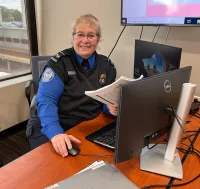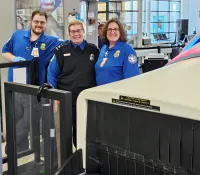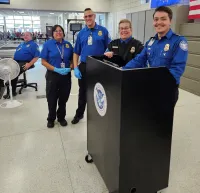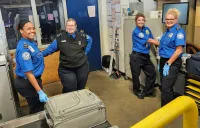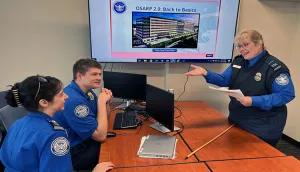 SBN STI Heidi Payton (right) with Officers Renee Jimenez and David Gomez. (Michael Ivancsics photo)
SBN STI Heidi Payton (right) with Officers Renee Jimenez and David Gomez. (Michael Ivancsics photo)
For nearly 22 years, Heidi Payton has carried out TSA’s mission with enthusiasm and extreme love for her job, and she’s as passionate today as she was in November 2002 when she launched her career with the agency.
Payton, a security training instructor (STI) at northern Indiana’s South Bend International Airport (SBN), calls STIs the “silent supporters” for TSA screening officers at our nation’s airports.
“The nurturers who make sure officers feel comfortable doing what they need to do and the reasons why, most importantly, we do it,” she explained.
After a two-decades-long airline career, the 9/11 terrorist attacks on the U.S. inspired Payton to start a new profession with TSA in the agency’s infancy, bringing a passion to teach and work with others.
“I heard about TSA, and I thought, ‘Well, you know what? Everything’s changed; everything’s different,’” she said. “Things changed drastically overnight, and that’s why I wanted to come into TSA. I did scheduling for the airlines, and I had done training. I had been a manager, and the scheduling operations officer job was available.”
After more than a decade with TSA, Payton landed her dream job with the agency – STI, and turning the page to today – over ten years later – she still has a zest for teaching others to detect threats to our aviation system.
“That’s where my heart is,” she said. “I love teaching people, encouraging people.”
However, it’s a super busy job without much down time, especially at a smaller airport like SBN. Her roles and responsibilities are vast for the 50 TSA officers for whom she’s responsible.
“You’re responsible for standard operating procedure changes and updates, for quarterly and annual training, maintaining our Online Learning Center as an administrator to ensure officers are getting their training in a timely manner,” Payton described. “You’re responsible for the testing process, checkpoint and baggage training and preparing officers for their practical skills certifications.
“I pull data from the X-ray simulators, the baggage machines. You’re responsible for maintaining employee numbers on the simulators, most of the training, taking all of the information from the training curriculum website, downloading computed tomography (CT) analogic X-ray sessions and loading them onto the simulators.”
So, you see, Payton has a lot on her plate every day.
No more ‘three strikes and you’re out’
When Payton became an STI, TSA had a “three strikes and you’re out” testing system. Screening officers who failed any one of their annual certification tests three times unfortunately lost their jobs, even though they may have been strong officers. However, the testing is much different today with a focus on remediation for officers who might struggle with some of the testing.
“It’s a much better process,” Payton said. “It’s much more simplified, making it easier for the officers. It makes more sense and is logical.”
Payton said testing can be very stressful on officers, and she believes the changes have improved employee morale across TSA while maintaining strong security operations.
“It’s not at the stress level of the old days,” she noted. “It is much, much better. TSA has done a good job.”
Payton said the current certification process involves one-on-one conversations between officers and supervisors, who let their screeners know “well done, good job, or you need to tweak this just a little bit.”
“I try to share with officers not to let the certification testing mess with their heads, because we do have folks with test anxiety,” said Payton. “There’s a lot riding on the tests.”
Giving new hires a great start
In Indiana, the TSA team at Indianapolis International Airport has taken over the first two weeks of training for the state’s newly hired screening officers. Payton then takes over training for SBN’s new hires over the next 60 days.
She then schedules them for two weeks at the TSA Academy in Glynco, Georgia.
When new hires come on board, Payton not only prepares them for frontline checkpoint and checked baggage screening but also encourages them to think about a long-lasting career in the federal government.
“I love to see young people get started in the government, because they have goals and aspirations,” assessed Payton. “I love to see young people continue their careers within the government. Our people move everywhere.”
Payton has seen officers from South Bend climb the TSA ladder, advance to Customs and Border Protection, national security intelligence, the State Department, Capitol Police, the Federal Drug Administration and other positions within TSA.
Payton, though, admits it takes a lot of hard work to get through initial basic training.
It’s huge, and then we are constantly training, keeping people certified, making sure we’re passing tests.”
Customer service, security operations with a smile
Officers aren’t only trained on the ins and outs of passenger and bag screening. Payton puts a big emphasis on customer service.
“It is so important how we treat our customers,” she said. “It’s going to make the work environment better. If the work environment is better, you know what’s going to stick out like a sore thumb – the bad person, the bad actor trying to get through our checkpoints.”
Payton strongly believes it’s her officers’ job to help educate passengers.
“To listen to them and share why we do some of the things we do,” she added. “You can tell them it’s done this way while being kind, outgoing, open. The checkpoints hum along if someone is in a good mood. It just flows. I love dealing with the passengers and our coworkers. I like people.”
Being kind to people is Payton’s modus operandi.
“Because the kindness you give out may just turn someone’s bad day around, and when you apply it at the checkpoint and what we do with protecting people, it’s a life and death thing,” she said.
Using her STI network
Networking and partnering with her fellow STIs across Indiana is crucial for Payton’s success.
“I’m very fortunate to have the cell phone numbers of the STIs down in Evansville, in Fort Wayne and Indianapolis,” said Payton. “When we first rolled out these analogic X-rays, Evansville was the first airport to get them. I made a lot of phone calls to the STI down there. She had a lot of good ideas, tips and tricks. Probably a phone call more than an email is the quickest way to communicate with and reach out to one of our sister airports.”
She frequently reaches out to a training specialist in Indianapolis to gather key information to help her and her South Bend team.
“There is so much to be done at this level at a spoke airport,” Payton said. “Fifty people are a lot to train. There is a lot to get done for each and every person, and it is challenging, because you wear so many hats.”
Payton gave a shout out to Indiana Training Manager Elizabeth Bruhn who occasionally brings all of the state’s STIs to Indianapolis to discuss the latest in training.
Just like the officers she trains every day, Payton is required to pass her certifications.
“They grade me on my practical skills, how I work at the travel document checker position, the walk-through or in baggage. I’m graded the same way the officers are.”
And she constantly has to stay on top of her game with frequent operational changes.
“I think we’ve had at least two this year,” Payton said. “Headquarters gives you a training package. Typically, there is a spring and fall standard operating procedures change, and if something rises to the occasion, there are mini changes. We have X amount of days to get it out, to brief, to get them changed onto the new procedures. It’s go, go, go!”
Her TSA manager Stacy Smith calls Payton “a valued member of the SBN workforce.”
“We are incredibly fortunate to have her on our TEAM,” Smith said. “Heidi displays extraordinary enthusiasm when it comes to training our officers in SBN. She encourages employees to acquire proper skills, attitudes and knowledge.”
“We protect people,” Payton emphasized. “They get off those airplanes safe and sound, come home to their loved ones. We bring them home. They put their head on a pillow at night, and they’re home with their family. There is nothing more special or more important than that. That’s what we do, and that’s what I try to instill in every class. It brings tears to my eyes, because it’s so important.”
By Don Wagner, TSA Strategic Communications & Public Affairs

